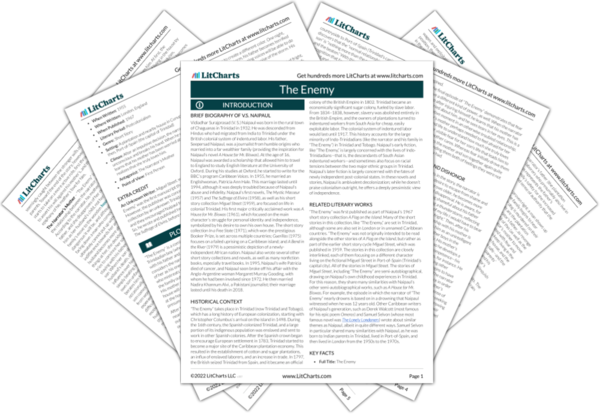“The Enemy” is filled with instances of disobedience or revolt against authority figures, both within the narrator’s family and within colonial Trinidadian society more broadly. The story takes place in the 1940s in Trinidad, when the country was still a British colony. Throughout the colonial period, Trinidad’s economy was fueled by sugar plantations. Although both slavery and indentured servitude had ended by the period when “The Enemy” is set, even “free” labor on these plantations was characterized by low wages and exploitation. The narrator’s father, in terms of social position, theoretically has the most authority of any character in the story: he wields power both in his family and in the plantation system as a driver who physically forces laborers to work faster. And yet the narrator’s father is ultimately a powerless and emasculated figure. For one, he’s terrified and helpless when people (implied to be the laborers he’s tasked with keeping in line) begin harassing the family outside their house at night. He’s also unable to keep his wife (the narrator’s mother) from leaving him, and eventually, he’s literally frightened to death by imagined dangers during a thunderstorm. The father’s weak authority perhaps indicates the fragile and illusory nature of his power in a society where he, too, is ultimately a colonized subject.
After the narrator’s father’s death, the narrator’s mother becomes the major authority figure in his life. And as the narrator grows older, he begins to revolt against his mother just as she earlier revolted against her husband by leaving him. The narrator starts having “crazy fits” in which he can’t bring himself to obey adults, especially his mother, feeling that he would “dishonor [himself] for life if I took anybody’s orders.” This urge to avoid “dishonoring” himself through obedience ultimately leads to fierce “struggle[s] between two wills,” his own and his mother’s, over seemingly trivial matters. But just as the laborers’ revolt against his father was seemingly a consequence of his father’s brutality toward them, and just as his mother’s revolt against his father was a consequence of his father’s violence and negligence toward her, so too is the narrator’s seemingly inexplicable urge to disobey his mother a predictable response to how she beats and humiliates him. In this way, the story uses the power dynamics in the narrator’s family and community to critique the broader context of Great Britain’s colonial rule over Trinidad, suggesting that violence only breeds more violence, and that abuses of authority inevitably lead to revolts against that authority.
Colonialism, Power, and Revolt ThemeTracker

Colonialism, Power, and Revolt Quotes in The Enemy
We were living at the time in Cunupia, where my father was a driver on the sugar estates. He wasn’t a slave-driver, but a driver of free people, but my father used to behave as though the people were slaves. He rode about the estates on a big clumsy brown horse, cracking his whip at the labourers and people said—I really don't believe this—that he used to kick the labourers.
I don’t believe it because my father had lived all his life in Cunupia and he knew that you really couldn't push the Cunupia people around. They are not tough people, but they think nothing of killing, and they are prepared to wait years for the chance to kill someone they don’t like.
Everybody agreed on one thing. My mother and I had to leave the country. Port-of-Spain was the safest place. There was too a lot of laughter against my father, and it appeared that for the rest of my life I would have to bear the cross of a father who died from fright. But in a month or so I had forgotten my father, and I had begun to look upon myself as the boy who had no father. It seemed natural.
In fact, when we moved to Port-of-Spain and I saw what the normal relationship between father and son was—it was nothing more than the relationship between the beater and the beaten—when I saw this I was grateful.
But you mustn’t get the impression that I was a saint all the time. I wasn’t. I used to have odd fits where I just couldn’t take an order from anybody, particularly my mother. I used to feel that I would dishonour myself for life if I took anybody’s orders. And life is a funny thing, really. I sometimes got these fits just when my mother was anxious to be nice to me.
Slowly the friendliness died away. It had become a struggle between two wills. I was prepared to drown rather than dishonour myself by obeying.
At times like these I used to cry, without meaning it, “If my father was alive you wouldn’t be behaving like this.”
So she remained the enemy. She was someone from whom I was going to escape as soon as I grew big enough. That was, in fact, the main lure of adulthood.
















